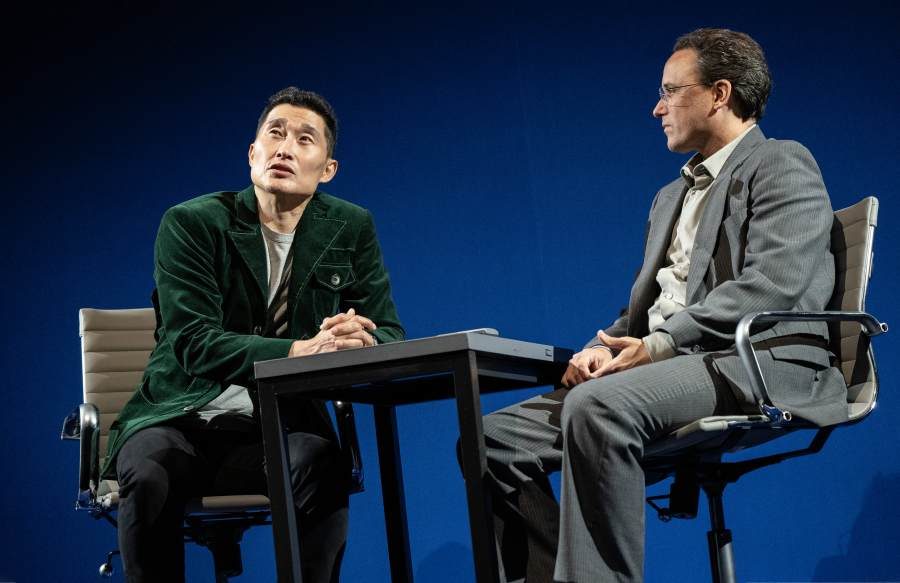

It can’t be easy portraying a living person, and it must be even more daunting when the person you are playing is the person who wrote the play. Such is the task for Daniel Dae Kim, the good-looking Korean star of “The King and I,” and “Hawaii Five-O.” He portrays DHH (David Henry Hwang) in Hwang’s play “Yellow Face.” The semi-autobiographical piece is based on some real events in the playwright's life mixed with fictional characters.
Years ago, Hwang (“M.Butterfly”) protested the lack of true Asian representation in the theater when he crafted a letter to the New York Times about casting white actor Jonathan Pryce as a Eurasian in “Miss Saigon.” As a result, Actors Equity banned the casting. When producer Cameron MacKintosh decided to not bring the play to the United States, Actors Equity reversed the policy, and, as we all know, the play was a Broadway smash with Pryce in the lead.
Hwang’s actual follow-up to “M. Butterfly” was a farce entitled “Face Value” that closed after only eight preview performances in 1993. “Face Value” was panned by critics who called it M. Turkey. The play included a plotline of putting a white actor in an Asian role.
Similarly,“Yellow Face” deals with whites in Asian roles. The main character, DHH, is determined to cast Asian actors in his next play. Unfortunately, through a series of misunderstandings, he casts Marcus (Ryan Eggold,) a white man. Later when DHH is attacked for it, rather than admit he made a mistake, he obfuscates, claiming that Marcus Gee is Siberian Jewish and therefore Asian. Subsequently, much to Hwang’s chagrin. Marcus is embraced by the Asian community, even becoming a spokesperson.
The more pertinent theme of “Yellow Face” deals with DHH’s father, Henry (Francis Jue.) He is portrayed in the play as a very successful, though idealistic man. Henry (HYH) loves American celebrities like Jimmy Stewart and Frank Sinatra and views America as the place where you can become who you want to be. HYH founded Far East National Bank, a successful international financial institution, yet he comes across as foolish, even silly. Later he comes under federal investigation when he’s wrongly accused of using Chinese money to influence American elections. Though he’d eventually be cleared of wrongdoing, it was enough to make HYH lose faith In his adopted country. I found it hard to take his character seriously and wondered how the playwright's actual father would have felt watching this portrayal.
Directed by Leigh Silverman who steered the original play in 2007, the play uses elements of fiction and nonfiction. The lines between the two blur, making us unsure what actually happened. When HYH is investigated by the government, the play notes that it will purposely not reveal the identity of the New York Times reporter who wrote the story. This device makes the play feel even more authentic.
Kim, an affable performer, overacts and seems too energetic, making exaggerated faces. He is bigger than life and smiles broadly, reminding us that this is a farce. Although the themes are heavy, the dialogue is witty and quick. Silverman directs her cast to deliver the material briskly and snappy. The staging is sharp and quick-paced as the talented actors go in and out of parts. The versatile ensemble, Marinda Anderson, Greg Keller, Shannon Tyo and Kevin Del Aguila play the many minor roles, often playing characters against ethnic type and gender and often real-life people.
At the very end, a dialogue between Marcus and DHH reveals that Marcus was a fictional character. Afterwards, I found myself looking up some of the incidents described in the comedy, especially curious to learn the name of the NYTimes reporter.
The term “Yellow Face” refers to white people playing Asian characters and the practice of wearing makeup and taping eyes to look Asian. The play becomes extremely didactic at the end as DHH and Marcus present a ‘lesson.’ The play, in a sense an homage to DHH’s father, deals with identity and being who you want to be. For the main character of the play, it refers to wearing a mask and hiding your true self.
Todd Haimes Theatre
227 W. 42nd St,
New York, NY